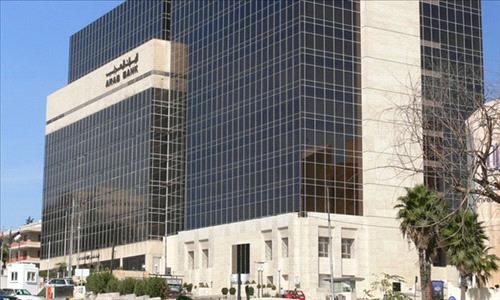Ammon News - AMMONNEWS - A judge has refused to upset a jury verdict that found Arab Bank civilly liable for the material support of Hamas during the Second Intifada.
"The verdict was based on volumes of damning circumstantial evidence that the defendant knew its customers were terrorists," Eastern District Judge Brian Cogan wrote in a 96-page decision released Wednesday, denying most of the bank's bid for judgment as a matter of law and rebuffing a request for a retrial.
In September, jurors found Arab Bank's knowing material support, in the form of financial services, was linked to 24 terror attacks in Israel carried out by Hamas between 2001 and 2004.
In their post-verdict motions, the Jordanian bank, which hotly disputes that it knowingly aided terrorists, said at the very least a new trial was required to correct "a miscarriage of justice" (NYLJ, Oct. 14, 2014).
Cogan said the bank's motion dissected the financial services it provided to individuals and organizations "without ever addressing the collective weight of all of these forms of support as evidence of either proximate causation or scienter. As did the jury, I reject this focus on the trees over the forest."
Nevertheless, Cogan said the plaintiffs, some 300 victims or their estates, failed to Hamas' responsibility for two of the 24 attacks.
In one of the two attacks, Cogan said while "Hamas certainly bears some moral responsibility ... there was insufficient evidence to support the jury's finding that plaintiffs had proven Hamas committed these attacks by a preponderance of evidence."
Cogan also refused to certify an interlocutory appeal to the U.S. Court of Appeals for the Second Circuit on the liability verdict.
The case is believed to be the first time a financial institution has been tried on allegations it violated the Anti-Terrorism Act's civil provisions. Cogan presided over the approximately six-week trial and will preside over an upcoming damages portion in Linde v. Arab Bank, 04-CV-2799.
Jury selection on a damages trial for three attacks, two suicide bombings and a roadside attack is scheduled to begin July 13.
Attorneys for the plaintiffs have not yet specified damages.
After the verdict in the closely watched case, the bank complained about incorrect jury charges on causation, flawed evidentiary rulings and the impact of a pretrial sanction, which Eastern District Judge Nina Gershon imposed as a consequence of the bank's failure to produce certain records.
Cogan's ruling addressed the bank's complaints, as well as what he said were failings in the bank's own case.
In 2010, Gershon imposed a sanction barring the introduction of state-of-mind evidence and allowing an adverse inference jury instruction. The bank said it failed to produce records because it was bound by foreign banking secrecy laws.
Arab Bank tried unsuccessfully to appeal the sanction to the U.S. Court of Appeals for the Second Circuit and the U.S. Supreme Court.
The U.S. Solicitor General submitted a brief in the bank's petition for certiorari; though advising the high court not to take up the matter, the government said the sanction was legally flawed and possibly jeopardized American relationships in the Middle East region. Besides, the sanction could be more narrowly tailored at the trial level, the government said.
The circuit refused to overturn the sanction at that point in the case. The Supreme Court declined to hear the bank's case.
In the post-verdict litigation, the bank argued Cogan applied the sanction too broadly and said it was an error not to reconsider the sanction in light of the solicitor general's position.
But the judge said the sanction "did not play out to be a critical factor in the case."
The plaintiffs had an "abundance of circumstantial evidence ... showing that defendant either had or deliberately ignored evidence that it was dealing with Hamas operatives."
Meanwhile, the defense focus on compliance with financial blacklists was "myopic," Cogan said.
The judge pointed to "miscues" by the defense, such as putting on an expert witness who "backfired in spectacular fashion" when, among other things, it came out on cross-examination that she could not speak Arabic.
Those aspects of the trial, along the with the "gaping hole" created by the refusal to turn over certain documents and testimony "substantially overshadowed the sanctions order," he said.
Cogan said solicitor general's brief did not persuade him to reconsider the sanction order, noting the government has never filed a statement of interest suggesting the case be dismissed.
The bank also challenged the legal reasoning that informed Cogan's jury charge.
For instance, after Gershon ruled plaintiffs did not have to "but for" causation, the bank unsuccessfully proposed jury instructions with the same "but for" causation to Cogan.
"As the only cases to directly address the issue have held, requiring 'but for' causation would effectively annul the civil liability provisions of the [Anti-Terrorism Act]. That cannot have been the intent of Congress in enacting them," he said.
Cogan said no court expressly said the civil provisions need "but for" causation; in the only appellate-level decision to address the issue, Seventh Circuit Judge Richard Posner "set forth a detailed and compelling explanation of why it does not," Cogan added.
The bank contended it was prejudiced by a trial examining liability for 24 separate attacks.
Cogan said the bank "vastly overstates the complexity of the evidence before the jury" and seemed to suggest that the only course was 24 individual liability trials.
"The overwhelming expense of doing that might well sound the death knell to plaintiffs' ability to finance this case, and since I am cognizant of that, I have to assume the defendant is as well," Cogan wrote.
In an interview, Gary Osen of Osen LLC, one of the plaintiffs' attorneys, said Cogan's ruling "affirms in an important way for us in the long run just how much evidence there was at trial and affirms our argument that the jury had more than enough incriminating evidence to reasonably conclude Arab Bank was liable."
*New York Times










 comment replay
comment replay 